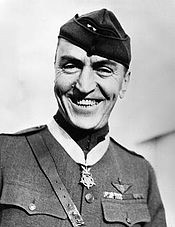Get Today in Masonic History into your Inbox. Sign up today for one of our email lists!
Need an article for your Trestleboard/Newsletter see our Use Policy
Edward Vernon Rickenbacker Passes Away

Today in Masonic History Edward Vernon Rickenbacker passes away in 1973.
Edward Vernon Rickenbacker is an American aviator and businessman.
Rickenbacker was born on October 8th, 1890 in Columbus, Ohio. He was born Edward Rickenbacher with no middle name and an "h" instead of a "k" in the spelling of his last name. From a young age, Rickenbacker loved machines and was encouraged by his father's words "A machine has to have a purpose." His father passed away when Rickenbacker was 13. His father's passing also ended Rickenbacker's formal education, although his love of machines inspired him to do correspondence courses on engineering and work with a variety of machines.
He become a well known race car driver prior to World War I. He raced at the Indianapolis 500 four times before the War. He earned the name "Fast Eddie."
After the start of World War I and before the United States entered it, Rickenbacker changed his name removing the "h" in "Rickenbacher" to, as he put it, "take the Hun out of his name." He also made up a middle name. He first signed autographs with a variety of letters for a middle initial, finally settling on a "V" and eventually creating the middle name Vernon.
He traveled to England at the beginning of World War I, eager to be part of the fighting. Although his Swiss heritage made him a concern for British authorities who thought he was a spy. He was under constant surveillance while in England. He returned to the United States before its official entry into the War.
In 1917, after the United States entered the War, Rickenbacker immediately enlisted and joined soldiers training France. Most men chosen as pilots during World War I had college educations, so Rickenbacker's superiors were reluctant to let him fly. After they discovered his skill with the mechanics of the aircraft, they were more reluctant to lose a valuable ground crew member. Eventually they allowed him to get his wings. He became an ace almost immediately shooting down 5 enemy aircraft. By the end of the War he was promoted to Captain and made the commander of his squadron. He flew more than 300 combat hours and shot down 26 enemy aircraft.
After the War, Rickenbacker was approached about exploiting his fame. He decided to do a Liberty bond tour. After the tour they released him from the military as a Major. He spent the rest of his life referring to himself as a Captain though as he felt it was the rank he earned.
In 1920, he started the Rickenbacker Motor Company. He sold cars which used advanced technology developed for racing. He introduced the first four wheel braking system. By 1927, he was forced to declare bankruptcy due to poor sales. Competitors are blamed by some for the failure, fearing their own slumping sales on existing cars, they engineered a smear campaign about the four wheel braking system. After Rickenbacker's bankruptcy, most cars came with four wheel braking systems.
Rickenbacker got into a very public dispute with President Franklin Roosevelt. He felt the President's policies were nothing more than socialism. In 1934, Roosevelt ordered all mail contracts rescinded. This directly effected the company Rickenbacker was running, Eastern Air Transport. The Roosevelt administration ordered NBC Radio not to allow Rickenbacker to broadcast opinions critical of Roosevelt's policies.
In 1938, Rickenbacker purchased the Eastern Air Transport from General Motors, he was running the company for them at the time. The company eventually became Eastern Air Lines. Rickenbacker flew regularly on Eastern Air Lines flights. On February 26th, 1941, he was in a major crash just outside of Georgia. His injuries were so severe doctors and emergency crews thought he was dead and it was reported in the media he had died in the crash. Despite his severe injuries, he is credited for helping people during the crash keeping their spirits up and telling those who were ambulatory what to do to help others, the whole time being pinned under debris.
Rickenbacker was also involved in a crash of a military aircraft in the South Pacific. It was only by a series of lucky events Rickenbacker along with most of the crew of the craft were able to survive. Again, Rickenbacker was reported as deceased in the media. They were adrift at sea for 24 days.
Rickenbacker suffered a stroke while in Switzerland seeking a special medical treatment for his wife. He later got pneumonia and passed away on July 23rd, 1973.
Rickenbacker was a member of Kilwinning Lodge No. 297 in Detroit, Michigan.
This article provided by Brother Eric C. Steele.

